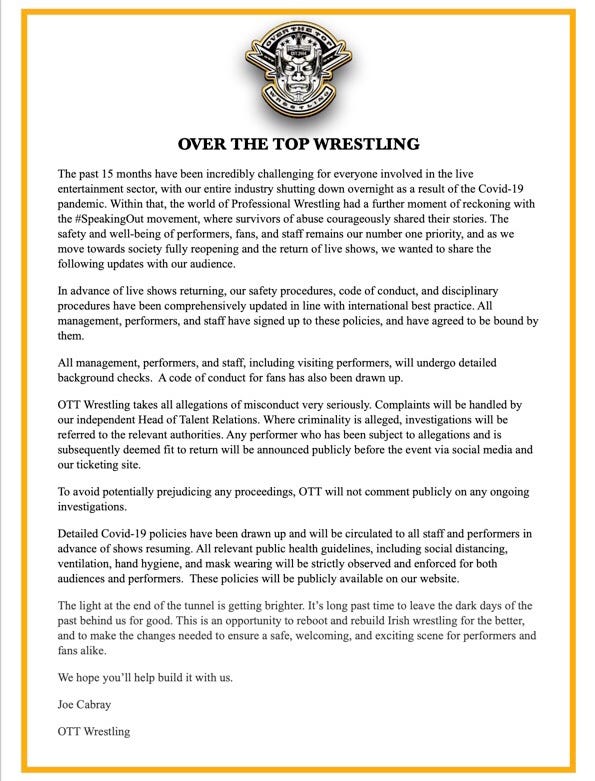At wrestling's crossroads, only one path leads to redemption (June 28, 2021)
It comes down to this: in a case of one person’s word against another, whose side would you rather be on?
It is now one year since the first allegations in the Speaking Out movement, and after the long pause in live events caused by the pandemic, independent wrestling promoters are beginning to set dates to return. It’s been a horrific year for many businesses, and the entertainment industry has felt it more than any other, as the inherent gathering of people in close proximity is the last thing that can be allowed to return in such contagious times.
Given the reality of COVID-19, there has at least been much time to plan for the return of indy wrestling, yet no promotion has effectively tackled the issue of Speaking Out, instead hoping that the discussion would either subside or that those fans who cared enough to put their money where their mouth is would have a limited effect on ticket sales.
Ireland’s Over The Top Wrestling has made some effort to address how it will provide a safer environment for fans and wrestlers, but has stopped far short of the transparency that would both do the right thing by those directly affected, and go a long way to setting an industry standard of which it, and its supporters, could be proud.
On June 9, OTT released a statement acknowledging that there were “survivors of abuse [who had] courageously shared their stories”, but quickly made clear that it would refer allegations of criminality to the police, therefore implying that while abuse did occur, OTT may decide to use the offenders1 anyway. Indeed, the phrase “deemed fit to return” was dangerously ambiguous, and failed to rule out even those found guilty of the most extreme crimes.
It is important to note both that many victims of abuse decide not to go to the police, due to the trauma of reliving the incident(s) and the low chance of prosecution, and that this is not OTT’s choice to make. Furthermore, the commitment that OTT would publicly announce the appearance of offenders “before the event via social media and our ticketing site” is of little consolation to those the promotion admits have suffered at those hands.
From a PR standpoint, and for the future of wrestling in Ireland, OTT is right to want to “leave the dark days of the past year behind us for good”, but by only confirming the existence of an agreed policy for wrestlers and a code of conduct for fans, and not making these available publicly, it is beginning its next chapter under a cloud of suspicion, which has not been aided by long-time roster members making attacks on fans in both public and private conversations.
To be clear, OTT is not the only company that is now planning to return without having adjusted itself to the need for transparency, which is a particular prerequisite for any outfit that launched itself to prominence via social media. Those same fans who came to adore these promotions, believing in them as local alternatives come good while enthusiastically promoting them to other fans, are now well aware of what some of their peers went through in personal confrontations with wrestlers, and will not be silenced if those same performers are again given elevated status through their bookings.
The current legal system may be the best we have, but it disproportionately lets down the victims of abuse, and cannot be considered the final word on these matters. No conviction does not mean that there was no crime, nor no impropriety, and promoters must now attend to Speaking Out with a new sense of discretion, sincerity, and empathy.
And so I appeal to everyone, when you hear a person say that they have suffered abuse, believe them first and carefully contemplate the matter thereafter.
After the devastation of COVID-19, it is this mindset that will set you and your business free to succeed again.
I use the word “offender”, which presumes guilt, because the OTT statement itself admits that incidents reported during Speaking Out did in fact occur (“survivors of abuse courageously shared their stories”). The word “offender” is used in that context throughout.





